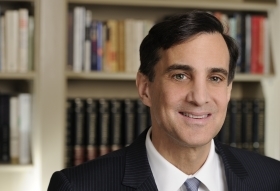Brett Hughes (1L)
This year’s convocation season saw rescinded invitations and canceled appearances for several high-profile speakers at American universities, including Condoleezza Rice and Christine Lagarde.
The University of Toronto joined in the fun by inviting its own controversial speaker for the Faculty of Law’s Class of 2014. Former U of T Law Dean (and former “Coca-Cola World Fellow”) Ron Daniels was selected as convocation speaker and honorary graduand. The decision attracted attention from Canada’s largest daily newspaper as well as a petition signed by more than 100 alumni.
Daniels was seen by many as an insensitive choice, given his role in aggressively increasing tuition fees and the lack of corresponding increases in financial aid. While many students and alumni were disappointed with the decision, they hoped it would serve as an opportunity for Daniels to address his tenure as dean and the associated consequences for public legal education and the legal profession in Ontario. As graduating student Kamal Bakhazi put it to the Toronto Star: “Does he stand by his legacy?”
Although Daniels spoke extensively about institutions, he did not address his legacy at this one.
On June 6, in an address that seemed more targeted to Munk School graduates than those at the Faculty of Law, he talked about developing countries and the role of institutions in development. Daniels shared accounts of his visits to “overcrowded health clinics where mothers hover restlessly over children whose bodies have been ravaged by preventable disease.” He stated that “consensus has now emerged […] that the quality of a country’s institutions matters more than anything else in determining whether countries succeed or fail.”
Daniels said that he focused on these issues because graduates have “the potential to stand as important contributors to the enterprise of rectifying the wrenching disparities that mark our world.” For many graduates, this resonated as a reference to jobs they have been priced out of because of their debt—those with NGOs and development agencies.
When Professor Jim Phillips spoke later in the afternoon, he joked that former Dean Moran had advised him: “the floor’s pretty much open, but don’t mention tuition.”
“So I won’t,” he said. Fortunately, not everyone got the memo.
Valedictorian Sarah Rankin said in her speech that the Class of 2014 was “driven,” “fearless,” “bold,” and “willing to take on every single issue, no matter how big or small.” True to form, they ensured that the elephant in the room did not go unnoticed. A group of students made and distributed yellow buttons to be worn on graduation gowns, along with the following explanation:
This button is part of a conversation. Students, faculty and alumni have been talking about how to keep law school accessible in the face of $30,000 annual tuition and fees. By wearing this button, we hope you’ll be part of that discussion.
More than one quarter of the graduating class wore the buttons, along with four faculty members on stage and many friends and family members in the audience.
And the buttons did spark discussion.
Several audience members nearby asked each other why people were wearing them. Some requested their own buttons after hearing the explanation. Others remarked that it was “stupid,” comparing the tuition concerns to the Quebec student protests. They lamented that resulting policy changes led to the loss of higher education tax credits that parents were previously able to claim. Munk School graduate Zach Paikin echoed the Quebec analogy, tweeting that the scene was reminiscent of his McGill graduation “at the height of the red square mvmt in Qc. Except no riots.” Indeed.
Former Dean Moran (and incoming Provost and Vice Chancellor of Trinity College) made a brief nod to affordability in her speech. She said it had been a “wonderful pleasure” to discuss tuition and financial aid with students—topics she described as “great issues of the day.”
Professor Hamish Stewart obliquely referenced the issue when he shared with everyone the answer to the question “What is law?” Stewart said that “I know the answer and I’m going to share it with you. For free.” (The answer involved Star Trek.)
President Daniels was unwilling to answer questions following the convocation ceremony, nor would he agree to an interview with Ultra Vires. He did, however, provide a brief written response to several questions.
I asked him about the growing gap between tuition and financial aid, noting that this trend had continued apace since his tenure (e.g. tuition increased 8% in 2012-2013 while financial aid only increased 1.57%). His reply included the following: “Stated simply: if and when tuition increases are necessary to preserve or achieve educational excellence, there must be a commensurate commitment to need-based financial aid.”
Daniels didn’t directly address the yellow buttons or the petition, but he did write: “Let there be no doubt, this is an important and impactful issue, worthy of our collective attention, and worthy of passionate advocacy.”
It is a shame that Daniels wasn’t willing to express these sentiments publicly on June 6. However, he did say one thing in his speech that I imagine most graduates would agree with: institutions “determine who among us holds and wields power and resources.” Later in the day, recipient of the Mewett Teaching Award, Professor Martha Shaffer, said that Alan Mewett “believed in the importance of ensuring that a legal education be accessible to all those who wish to pursue it.”
Here’s hoping our new dean shares that vision.






